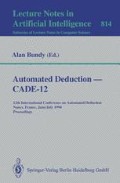Abstract
In this paper we present a weak and a strong intuitionistic calculus for query answering in Description Logics (DL). Given the standard model-theoretic semantics for DL, a complete query-answering calculus has to perform complex case analyses to cope with implicit disjunctions stemming from some of the concept-forming operators in DL. To avoid this complexity we propose an intuitionistic approach to query answering based on the Sequent-Calculus-style axiomatization of DL we have developed in [20] and [21]. By taking into account only the intuitionistic inference schemata of this axiomatization, we obtain a strong intuitionistic query-answering calculus. An additional restriction to reasoning about explicit objects allows a further simplification of the proof theory and yields a weak intuitionistic calculus.
We prove completeness of these calculi wrt axiomatic semantics based on the Intuitionistic Sequent Calculus. For the weak calculus we also give a least fixed point semantics as known from Deductive Databases and Logic Programming.
Preview
Unable to display preview. Download preview PDF.
References
K. Apt, H. Blair, A. Walker, “Towards a Theory of Declarative Knowledge”, in Workshop on Foundations of Deductive Databases and Logic Programming, Washington, 1986
F. Baader, B. Hollunder, “Embedding Defaults into Terminological Knowledge Representation Formalisms”, in KR-92, 306–317
F. Bancilhon, D. Maier, Y. Sagic, J. Ullman, “Magic Sets and other Strange Ways of Implementing Logic Programs”, in Principles of Database Systems (PODS-86), 1–15, 1986
RJ. Brachman, J.G. Schmolze, “An Overview of the KL-ONE Knowledge Representation System” Cognitive Science 9, 171–216, 1985
R. Brachman, D.L. McGuiness, P.E. Patel-Schneider, L. Alperin Resnick, A. Borgida, “Living with CLASSIC: When and How to Use a KL-ONE-like Language”, in, J. Sowa (Ed.), Principles of Semantic Networks: Explorations in the Representation of Knowledge, San Mateo: Morgan Kaufmann, 401–456, 1991
F.M. Donini, M. Lenzerini, D. Nardi, W. Nutt, “Tractable Concept Languages” UCAI-91, 458–463
F.M. Donini, M. Lenzerini, D. Nardi, A. Schaerf, W. Nutt, “Adding Epistemic Operators to Concept Languages”, in KR-92, 342–353
J. Gallier, Logic for Computer Science; Foundations of Automatic Theorem Proving, New York: Harper and Row, 1986
J.Y. Girard, “Linear Logic”, Theoretical Computer Science, 50, 1987
J.Y. Girard, Y. Lafont, P. Taylor, Proofs and Types, Cambridge: Cambridge University Press, 1989
T. Hoppe, C. Kindermann, J.J. Quantz, A. Schmiedel, M. Fischer, back V5 Tutorial & Manual, KIT Report 100, Technische Universität Berlin. 1993
J.M. Kerisit, R. Lescoeur, J. Rohmer, “The Alexander Method: a Technique for the Processing of Recursive Axioms in Deductive Databases”, New Generation Computing 3(4), 1986
H.J. Levesque, “Foundations of a Functional Approach to Knowledge Representation”, Artificial Intelligence 23, 155–212, 1984
J.W. Loyd, Foundations of Logic Programming, Berlin: Springer, 1987
B. Nebel, Reasoning and Revision in Hybrid Representation Systems, Lecture Notes in Artificial Intelligence 422, Berlin: Springer, 1990
T. Przyymusinski, “On the Declarative and Procedural Semantics of Logic Programs”, Journal of Automated Reasoning 5, 167–205, 1989
J.J. Quantz, G. Dunker, V. Royer, “Flexible Inference Strategies for DL Systems”, to appear in International Workshop on Description Logics, Bonn, 1994
J.J. Quantz, B. Schmitz, “Knowledge-Based Disambiguation for Machine Translation”, Minds and Machines 4, 39–57, 1994
R. Reiter, “On Asking What a Database Knows”, in J.W. Loyd (Ed.), Computational Logic, Berlin: Springer, 96–113, 1990
V. Royer, J.J. Quantz, “Deriving Inference Rules for Terminological Logics”, in, D. Pearce, G. Wagner (eds), Logics in AI, Proceedings of JELIA '92, Berlin: Springer, 84–105, 1992
V. Royer, J.J. Quantz, Deriving Inference Rules for Description Logics: a Rewriting Approach into Sequent Calculi, KIT Report 112, Technische Universität Berlin, 1993
J.E. Stoy. Denotational Semantics: The Scott-Strachey Approach to Programming Language Theory, Cambridge: MIT Press, 1977
G. Sundholm, “Systems of Deduction”, in D. Gabbay, F. Guenthner (eds), Handbook of Philosophical Logic, VoL I, Dordrecht: Reidel, 133–188, 1983
Author information
Authors and Affiliations
Editor information
Rights and permissions
Copyright information
© 1994 Springer-Verlag Berlin Heidelberg
About this paper
Cite this paper
Royer, V., Quantz, J.J. (1994). On intuitionistic query answering in description bases. In: Bundy, A. (eds) Automated Deduction — CADE-12. CADE 1994. Lecture Notes in Computer Science, vol 814. Springer, Berlin, Heidelberg. https://doi.org/10.1007/3-540-58156-1_23
Download citation
DOI: https://doi.org/10.1007/3-540-58156-1_23
Published:
Publisher Name: Springer, Berlin, Heidelberg
Print ISBN: 978-3-540-58156-7
Online ISBN: 978-3-540-48467-7
eBook Packages: Springer Book Archive

